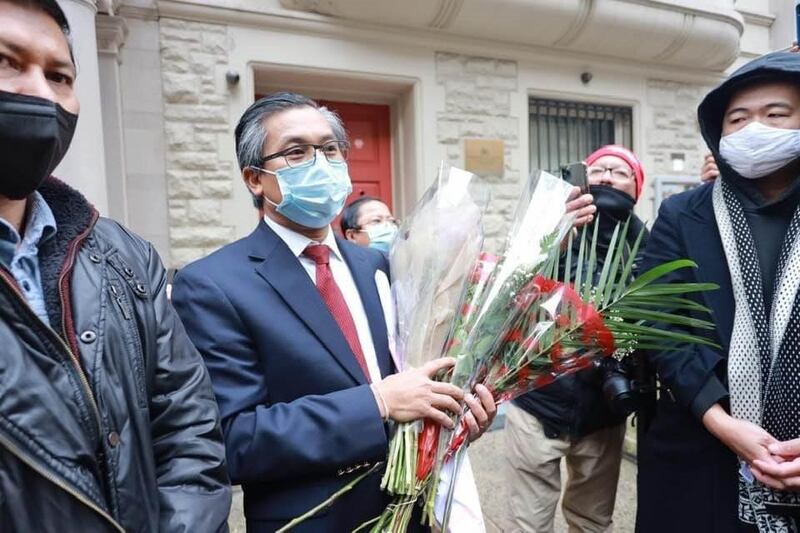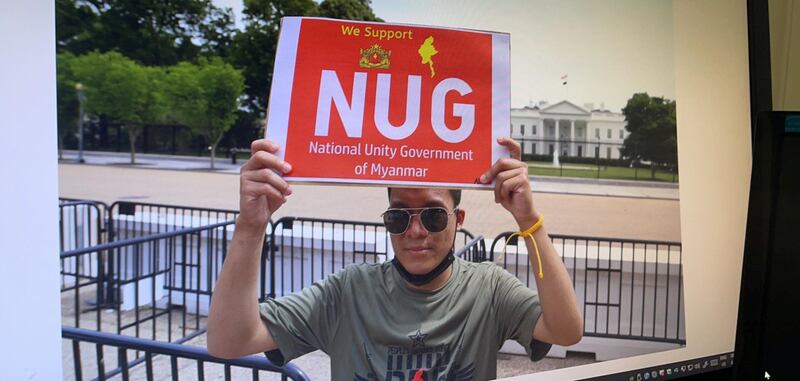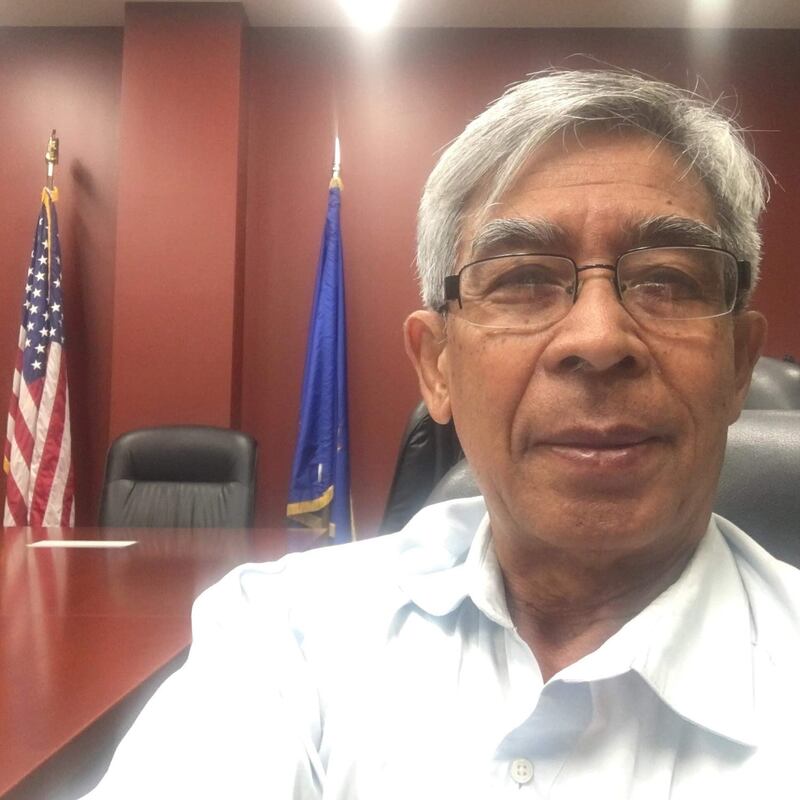New details have emerged about the alleged plot to assassinate Myanmar’s ambassador to the United Nations and how the conspiracy to attack this key critic of the nation’s military junta was foiled.
Sources close to the ambassador tell Radio Free Asia that one of the plotters arrested in early August was on a team of security volunteers at Myanmar’s U.N. mission in New York, but was sidelined because he was suspected of intruding into the ambassador’s office. He later confessed to his involvement in the plot to kill Ambassador Kyaw Moe Tun.
U.S. authorities revealed the plot on Aug. 6, after they arrested the security volunteer, Phyo Hein Htut, 28, and another suspect, Ye Hein Zaw, 20, who is said to have been an intermediary who sent money from an arms dealer in Thailand to bankroll the attack. The alleged goal was to force Kyaw Moe Tun to step down as Myanmar's permanent representative to the UN. Both suspects are Myanmar citizens residing in New York.
RFA spoke at length with Thaung Hlaing and Phoe Khwar, who are among Burmese democracy activists living in New York who volunteered to help provide security for the ambassador because of fears for his safety after he spoke out against the military junta that seized power Feb. 1. Phoe Khwar was once a student activist, who served as a bodyguard for Aung San Suu Kyi after her release from house arrest in 1995 – long before she emerged as the nation’s civilian leader.
The ambassador has previously told RFA that he learned of the plot from the Burmese community in New York who have rallied around him since he gave a high profile address Feb. 26 to the U.N. General Assembly, appealing to the international community to end military dictatorship and help restore democracy in Myanmar. The junta has demanded he step down as an ambassador, which he has refused to do.

A U.N. credentials committee is expected to meet to decide about who represents Myanmar at the world body, which opens a new General Assembly session and holds its annual gathering of world leaders in mid-September.
Thaung Hlaing said the Burmese pro-democrats in New York had been concerned that the ambassador could be shut out of his own embassy by the military – the fate of Myanmar’s ambassador to London in April. So they changed locks at Myanmar’s U.N. mission in New York, guarded it day and night, and provided an escort to the ambassador when he traveled outside the mission.
Among the volunteers assigned to guard the building was Phyo Hein Htut who had befriended Phoe Khwar.
Phyo Hein Htut had past associations with Suu Kyi’s National League for Democracy party. He had participated in the Mother’s House, or Amay Eain, an NLD-run education network. He spoke good English and was part of a delegation from the network that visited China in 2017, according to Myo Yan Naung Thein, an NLD researcher. Phyo Hein Htut had also attended the Yangon School of Political Science.
He departed Myanmar for the United States in September 2019, spent time in San Francisco before coming to New York, his Facebook history shows. He did various casual jobs, and after the coup in Myanmar, he took part in a pro-democracy demonstration in New York on Feb. 12. He also attended an anti-coup protest in front of the White House in Washington, D.C., on May 22, a photo of the event taken by an RFA reporter shows.

But his behavior on the ambassador’s security detail raised suspicions. Thaung Hlaing told RFA that one night Phyo Hein Htut entered the room of the ambassador’s secretary to take pictures.
“We had four guys during the day and four guys during the night taking turns on sentry duty,” Thaung Hlaing said. “Each man slept for three hours at a time. And this guy (Phyo Hein Htut) while on sentry duty went into the room of the ambassador’s secretary, a Filipino woman, and took pictures.”
“Nobody knew about that at first. After two days, the ambassador told Phoe Khwar that his secretary had complained someone had entered the room. I think she was talking about some documents not being in the proper place.”
After that Phyo Hein Htut was not allowed to enter the mission premises.
It would later emerge after the two suspects were charged, that Phyo Hein Htut had been contacted over Facebook and Facetime by the arms dealer in Thailand. According a deposition by an FBI agent, Phyo Hein Htut said the arms dealer had seen a picture of him at the Myanmar mission and had offered him money to hire attackers to kill the ambassador.
Thaung Hlaing identified the arms dealer, who has not been named by U.S. authorities, as a Bangkok-based friend of Phyo Hein Htut’s father. He allegedly appears in a photo at the Myanmar Embassy in Bangkok taken in August 2017. RFA was not able to independently verify the identity of the person named by Thaung Hlaing or trace him to seek comment.
Phyo Hein Htut’s motives for allegedly conspiring in the plot, which he would subsequently reveal to Phoe Khwar and Thaung Hlaing, remain obscure. RFA has sent e-mails to his lawyer for comment, but has received no reply as of Wednesday.
Phyo Hein Htut may have been short of money. A restauranteur in New York who requested anonymity to speak about the suspects who had visited his restaurant, said that a friend of Phyo Hein Htut’s father who had provided him accommodation in New York had kicked him out of the house.
“The young man said he didn’t want to do it but he accepted the money as he needed it,” Thaung Hlaing said of the plot. “And he told me that he had planned to tell us about the plot. We asked him to tell us everything and promised we would try to extricate him from the plot.”

Given the gravity of the alleged conspiracy, the amount of money he got for his role in it seems small. According to the FBI deposition, the other suspect, Ye Hein Zaw transferred $4,000 from the arms dealer to Phyo Hein Htut through a money transfer app as an advance payment on the plot to attack the ambassador. Phyo Hein Htut then requested another $1,000 to finish the job.
And who ordered the plot remains murky. Logic suggests that those who would benefit from forcing the ambassador to step down were supporters of coup leader Gen. Min Aung Hlaing. The junta has denied involvement.
But there are some clues suggesting Phyo Hein Htut and his family had ties to senior figures in the military. A photo provided by Phyo Hein Htut to Thaung Hlaing shows him next to Kyaw Kyaw Naing Tun, a grandson of former junta chief Senior Gen. Than Shwe. The two men used to frequent Yangon nightclubs together, Thaung Hlaing recounted Phyo Hein Htut as saying.
Phyo Hein Htut initially revealed the plot to kill the ambassador to Phoe Khwar. Thaung Hlaing said he subsequently met with Phyo Hein Htut on Aug. 2 and listened in on a phone conversation he had with the arms dealer. They met again in New York’s Central Park with Phoe Khwar, at which point Phyo Hein Htut revealed that hotels had been booked in New York and Westchester for two other alleged plotters who were to arrive from overseas.
At this point, Thaung Hlaing informed ambassador, who alerted U.N. security officials. The FBI questioned Thaung Hlaing that night, and the following day, Aug. 4, Phyo Hein Htut was arrested. Ye Hein Zaw was arrested Aug. 5.
On Aug. 6, Phyo Hein Htut and Ye Hein Zaw were charged with conspiracy to assault and make a violent attack upon a foreign official, which carries a maximum sentence of five years in prison.
Translated by Khin Maung Nyane and Ye Kaung Myint Maung.

